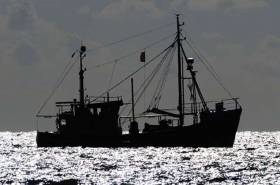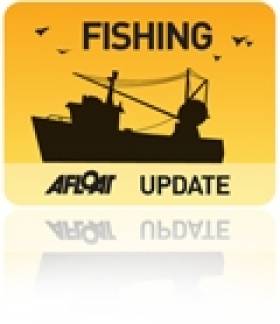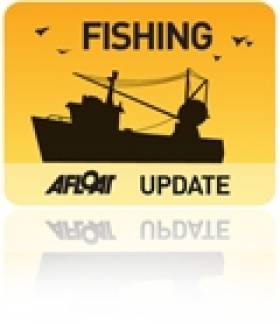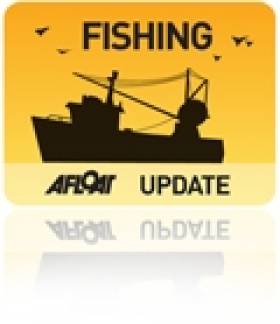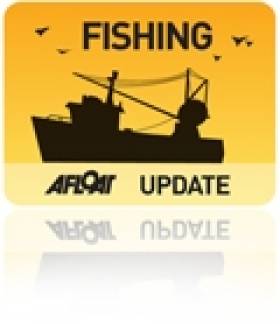Displaying items by tag: fishing industry
Qualified Welcome from Fishing Industry for Ecological Analysis on MPAs in West Irish Sea
Irish fishing industry organisations have given a qualified welcome to an ecological analysis relating to potential marine protected areas (MPAs) in the Irish Sea.
The recently published report recommends a list of 40 sensitive species and habitats which should be protected when MPAs are designated in the western Irish Sea.
Angel shark, basking shark, tope, American plaice and the European eel are among the 40 species and habitats, along with the blonde ray, cuckoo ray, edible sea urchin and short-snouted sea horse.
Some 18 of the features or species nominated, including 14 fish, which are already on protected lists.
The 132-page report does not include species or habitats already listed in the EU Birds and Habitats Directives, or individually managed under the EU Common Fisheries Policy (CFP).
Prof Tasman Crowe, director of University College, Dublin’s Earth Institute, and a group of scientists were given four months to come up with an ecological analysis informing new legislation on MPAs.
They were asked to focus on the western Irish Sea area extending from Carlingford Lough to Carnsore Point, where the first concentration offshore wind farms will be built off the Irish coast.
The Government has committed to designating 30 per cent of Ireland’s “blue field” as marine protected areas (MPAs) by 2030 in line with EU commitments, and MPA legislation is expected to be in place by the end of the year.
The ecological study notes that it is a key area for commercial fishing of the Dublin Bay prawn, whelk and herring, and profiles the extent of fisheries for scallop, cockles and pot fishing for whelks.
It also documents fisheries for razor clams, dredging for mussel seed, beam trawl fishery for rays and mixed demersal fish, along with bottom trawling targeting rays and mixed demersal fish.
It says it is “important to note that the full extent” of areas within which the 40 species or habitats are found would not be required for an effective network of MPAs, and notes that “not all activities would need to be restricted within them”.
National Inshore Fishermen’s Association secretary Kieran Healy said that he had represented his organisation on the stakeholder consultations for the report, and the authors had emphasised that transparency had to be a key factor.
“We were invited to have our say and to elaborate on our concerns, so I couldn’t find any fault with the process,” Healy said.
He said that the report was “extremely well put together” and “everybody’s contribution is addressed”.
“It is quite up front about there having to be some sort of tradeoffs in relation to bottom trawling, dredging and beaming,” he said, and he believed fishermen should be allowed to state their case.
However, Healy also urged “all fishermen to read this report”.
IFPO chief executive Aodh O’Donnell said it was “important that this work is done, but the issue we would have is that it was compiled in very little time”.
“There was also no matching socio-economic impact analysis, and we are calling for this to be done,” O’Donnell said.
“A very high percentage of the areas where there is fishing for Dublin Bay prawns and mussel seed falls into the scope of what is being considered, so we need a proper study of the impact,” he said.
Irish South and East Fish Producers’ Organisation (ISEFPO) chief executive John Lynch said that the report was “very comprehensive” and welcomed an approach which focused on species or sensitive structures and habits.
The report is “probably the closest thing Ireland has to a marine spatial plan”, Lynch said, and it highlighted that “the sea is a very busy place” and there is “still a job of work to do”.
Tributes to Former Seafood Review Group Chair Dr Noel Cawley
Tributes have been paid to Dr Noel Cawley, a leading figure in the food and equine sector who also played a key role in several Government seafood initiatives.
Dr Cawley, who died late last month at the age of 78 after a short illness, was former chief executive of the Irish Dairy Board and chair of Teagasc and the Irish Horse Board.
However, he was appointed chair of the Government’s seafood review and implementation group in June 2006, along with former Killybegs Fishermen’s Organisation chief executive Joey Murrin and Údaras na Gaeltachta chief executive Ruan Ó Bric.
The 600 million euro “Cawley strategy” for the fishing industry published in January 2007 included a 66 million euro fleet decommissioning scheme. He had no knowledge of the fishing industry, but applied his vast experience in the food sector to draw up a roadmap he was also asked to implement.
Cawley remarked that he “met so many fine, decent people” during consultations around the coast that “you often wonder why [Government] departments can't go out more and meet and explain”.
“Whereas farmers own their land, fishermen don't. This makes the uncertainty for them all that much greater," he noted.
He also remarked at the time that when he came up with any “daft notions”, Joey Murrin would put him right.
In November 2013, the then marine minister Simon Coveney also asked him to chair a national implementation group on discards of fish. This followed the introduction of a new policy to end the wasteful practice of discarding fish at sea, as is a key part of the reformed Common Fisheries Policy.
Minister for Agriculture and the Marine Charlie McConalogue was among those who paid tribute to him after his passing on June 29th.
Read his obituary in The Sunday Independent here
The devastating invasion of Ukraine by Vladimir Putin’s forces has focused minds on reducing energy dependence on Russia, with Ireland Inc gearing up to be the “Saudi Arabia” of offshore renewable.
However, the Government’s delay in setting up a liaison forum between the offshore renewable industry and a major stakeholder, the fishing industry, has opened it up to claims that it has set the two sectors on an avoidable “collision course”.
Fishing industry leader John Lynch and south-east vessel owner Caitlin Uí Aodha, who was the first female skipper to secure a BIM boatbuilding grant some decades ago, both voiced their concerns about this at a recent conference hosted by Simply Blue Energy at the National Maritime College of Ireland in Cork.
Apart from the impact on fishing grounds, there are also concerns about unknown environmental effects - a recent study found that the migratory path of brown crabs may be shifted irreversibly by the geomagnetic fields coming from turbine cables.
“We want to be green – but we simply don’t know enough,” Uí Aodha has said in an interview with Wavelengths below
Fishing Industry Warns Marine Minister Over New Penalty Points Legislation Without Recourse to Appeal
Fishing industry organisations have warned Minister for Marine Michael Creed that they will “take him on anywhere and everywhere” if he reintroduces a system of penalty points for commercial fishing breaches without recourse to an appeal writes Lorna Siggins.
Mr Creed outlined the options to Cabinet yesterday on bringing forward new legislation on penalty points, and wording is currently being prepared.
Fianna Fáíl TD and Leas Cheann Comhairle Pat the Cope Gallagher also said he was “very surprised” that Mr Creed planned to table a new statutory instrument on the issue without consulting with the Opposition.
However, a spokesman for Mr Creed said there would be communication with Mr Gallagher, who had put forward his own alternative legislation.
The EU penalty points system applies to serious breaches of EU fisheries legislation, and industry organisations have said they have no issues with the system in principle.
The Government has made three attempts since 2014 to transpose the system into Irish law by way of a statutory instrument (SI), with the latest wording in May 2018 permitting an appeal to the High Court.
However, there was criticism of its failure to allow sufficient time for appeal and the fact that points would remain on a licence even if a fisherman was cleared in court.
It became the first statutory instrument in the State’s history to fall in a vote, and Irish Fish Producers’ Organisation (IFPO) chief executive Francis O’Donnell said the industry was confident that Fianna Fáíl, Sinn Féin and Independent TDs understood the industry’s continuing concerns.
"We will take the minister on anywhere and everywhere if there is no recourse to appeal, and points remain on a license if a fisherman is exonerated," Mr O'Donnell said. Industry organisations who had been briefed by Mr Creed yesterday were united in their views, he said.
Mr Creed has said Ireland could lose out on up to 37.2 million euro in money from the European Maritime and Fisheries Fund if penalty points legislation is not put in place.
However, Mr Gallagher said that if the Government was so concerned about this funding, “where was it for the last 14 months” since he had tabled alternative legislation.
Mr Gallagher said he had not received a response over that 14 months to his alternative wording.
A spokesman for Mr Creed he was “endeavouring to take on board many of the recommendations raised in last year’s Dáil debate on the issue” in putting forward the new SI.
Last year, the Attorney General Seamus Wolfe warned that a new penalty points system aimed at fishermen who engaged in illegal, unreported or unregulated fishing could face a Supreme Court challenge, and described the legislation then as "controversial" and "difficult".
"The EU loves these things about sanctions regimes. Instead of just prosecuting people and having the criminal system and the civil system, you've something in between which is a sanctions regime," he was reported to have said, speaking at a lunch in March, 2018 organised by the Association of European Journalists, which was attended by 50 people from journalism, public relations and lobbyists..
Mr Woulfe said many people had queried whether somebody accused of wrongdoing should be entitled to have a jury trial. "The answer is 'no' under the EU system so we're going to have trips to the Supreme Court about all of that."
Pioneering Programme for Isle of Man Scallop Fishery
#FISHING - Conservationists and the fishing industry have joined forces in a new venture to evaulate the state of the Isle of Man's scallop fishery, as the Guardian reports.
Both sides will co-manage the 35-square-mile Ramsey marine nature reserve in the Irish Sea, collecting data to show what progress the scallops have made since fishing in the area was banned in 2009.
It is hoped that the study will lead to a renewing of leases for scallop fishing, which is worth up to £12 million annually to the Isle of Man's economy - though industry leaders have doubts that the new arrangement will serve the island's fishermen.
Some 2.6% of Manx waters are protected, with more than 1% 'highly protected', which is in stark contrast to the rest of the United Kingdom after plans for a national network of conservation zones were shelved till at least next year.
The Guardian has much more on the story HERE.
Irish Skipper Expo Visitor Numbers 'Exceed Expectations'
#FISHING - The 2012 Irish Skipper Expo has been hailed by organisers as the most successful to date, as World Fishing reports.
Over 100 companies displayed their products and services to more than 4,500 visitors from the fishing industry and retail and catering sectors at the Skipper Expo International 2012, held at the Galway Bay Hotel on 24-25 February.
As previously reported on Afloat.ie, Marine Minister Simon Coveney was on hand to launch a new initiative promoting the use of selective fishing nets, and he was full of praise for the weekend-long exposition.
“I am very impressed by the scale and expanse of this event which showcases a wide range of products and services for the fishing industry," he said. "While visiting the stands, I was able to meet and discuss with fishermen current issues and also get a good understanding of the latest developments and innovations in their industry.”
Sharon Boyle, event manager at organisers Mara Media Ltd, added: "The support from the industry continues to be very strong for this show and the number of visitors during the two-day event once more exceeded expectations in what was a very busy weekend.
"Dates for next year’s show are 1-2 March, being held once more at the Galway Bay Hotel.”
New RTE Documentary Series on Irish Fisherman
RTE turns its cameras on Ireland's fishermen in a six-part series starting this Sunday on RTE One. Skippers takes the Irish audience aboard working fishing vessels in the Irish fleet to meet the men who lead these boats; the Skippers.
Crews in pursuit of their lucrative catch, involving long absences from home, 24 hour shifts, huge waves, 80-mile-per-hour gales, and the unpredictability that is the ocean itself are part-and-parcel with this job.
The series was shot by DV Directors who ate, slept, breathed and fished with our Skippers while they were out on the high seas in the world's most dangerous job, creating a sense of immediacy with the audience at home; bringing the action, and turmoil wave by wave, roll by roll. Visually stunning images of the Irish coastline and sea wildlife, along with the roaring ocean will compliment the strong-character presence of our Skippers and their crews, with the illusive lights of home becoming a beacon in the night for the Skippers as they make their way ashore after their gruelling trips.
In the first episode, two former construction workers try to make a go of it at sea, a fisherman's wife tells her story, and a mystery fish causes havoc for a trawler crew and a rookie skipper feels the pressure to make the grade.
THE SKIPPERS
DAVID PRICE:
Howth in North County Dublin is home to the Price fishing family and youngest son David is carrying on the tradition as an energetic skipper on his fathers 60 foot, €2 million trawler "The John B". David is fishing 80 miles off the east coast of Ireland in search of prawns. Times have changed for David as he has to work twice as hard as he did five years ago when he used to sell his prawns for double what he's getting for them today.
David is frustrated with regulations that make little sense. He has to throw away perfectly good fish due to quotas. The pressure of costs versus the price he is receiving for his catch is not adding up and this frustration is sometimes taken out on his crew.
The collapse of the building industry has meant that some Irish are looking at fishing again for work. This trip has brought on board two former construction workers John and Emmet who both want to make a go of it in the fishing business. For John it's a big change from his previous job as a plumber but he's hoping he won't have to be fishing for too long.
This trip will be make or break for the two Irish lads as David has to decide if they are cut out for the hard life at sea.
His training is tough and they won't be getting any special treatment.
ROSS CLASSON:
Portnoo in Donegal is home to 42-year-old skipper Ross Classon. He's been fishing since he was 15. But Ross has no family background in the industry and is the son of a school principal. He went to sea purely because he loved it. This comes with a price to pay as he has less time to spend on shore with his family, when he does come home it is not long before Ross has to leave again.
His wife of 25 years, Anna, remembers the strain of bringing up their sons while Ross was out at sea. Anna has learned to deal with not seeing Ross for weeks at a time, she's learned to cope but she knows other families who haven't found things so easy. Ross's boat is based in Ullapool, Northern Scotland. He has to make the 430 mile journey by road and sea.
MICHAEL MEADE:
60 miles off the south coast of Cork is skipper Michael Meade. He's been fishing for the past 25 years and has owned his trawler the Buddy M for the past 10 years. Along side Michael are four regular crew members including Brendan from Cork and Sergey from Warsaw. Michael has seen the fishing industry slowly being eroded and is not too hopeful for the future. He fishes out from the small port of Cross haven in Cork.
CATHAL O'SULLIVAN
The old fishing village of Castletownbere in Co. Cork is where the ambitious and determined Cathal O'Sullivan is based. Cathal has no background in fishing and originally comes from Kenmare in Kerry. He started fishing at 16 and now at 24 is one of Ireland's youngest skippers in charge of the 40foot trawler the Tea Rose. This €1 million boat is owned by Paddy O'Sullivan who has recently put his faith in Cathal to go it alone.
Cathal leaves behind a young family, his son gets upset each time Cathal leaves , but Cathal's duration at sea is getting longer due to the rising price of fuel and the decrease in the value of his catch. He often will do three fishing trips in a row leaving his family for up to 20 days at a time. With every trip comes the pressure of finding a good catch for the crew in order for himself and his men to earn a decent wage
New Safety Scheme for Irish Fishermen
Minister of State at the Department of Agriculture, Fisheries and Food, Sean Connick, T.D. has formally launched a new programme of financial support to assist fishermen upgrade critical life-saving, fire-fighting, and other safety equipment on-board their fishing boats.
The delivery of the scheme is projected to provide up to €3 million of funding over the next five years, subject to budgetary provisions. The scheme will be administered by Bord Iascaigh Mhara (BIM), the Irish Sea Fisheries Board. In addition to fishing boats, the scheme also provides for the purchase of 'on-board' safety equipment for registered vessels used for sea-angling and other forms of marine tourism.
Speaking at the launch in Wexford, Minister Connick explained the importance of this timely scheme. "I am only too aware of the pain and suffering that is caused to the families and our coastal communities as a result of accidents at sea. We were unfortunately reminded of the dangers of the sea again this weekend with the news of the accident off Helvic Head yesterday. It is imperative that we do all in our power to prevent further accidents and especially casualties and one of these preventative measures includes ensuring our fishing fleet is operating to the best safety standards. This new scheme will enable up to 800 vessels to modernise their onboard safety equipment to further protect fishing crew. However, it is not enough to have a modern vessel, all skippers and crew must complete basic safety training and I would encourage all fishermen, who have not already done so, to contact BIM to complete their safety training without delay".
The Fleet Safety Scheme is an integral part of the 2007-2013 National Development Plan - Sea Fisheries Development Programme and is intended to further improve the overall safety standards onboard Irish fishing vessels. Under the previous Fishing Fleet Development Measure 2000-2006, 1,234 vessels availed of assistance under the Fleet Safety scheme and received grant aid of €2.23 million in support of €5.57 million investment. The current scheme which will run from 2010-2015 will provide grant aid of up to 40% for the purchase and installation of safety items including statutory lifesaving, fire-fighting, navigation and communication equipment.
Rose McHugh, Chair of BIM in welcoming the Minister's announcement said "On behalf of BIM, I would like to thank Minister Connick for his support and approval of this important scheme. Safety is paramount for the Irish fishing industry and this package will help fishermen in these difficult times to modernise their vessels in line with safety standards which will ultimately help to save lives at sea".
Applications and details on the Fleet Safety Scheme and the three other schemes under the Sea Fisheries Development Programme are available from www.bim.ie



























